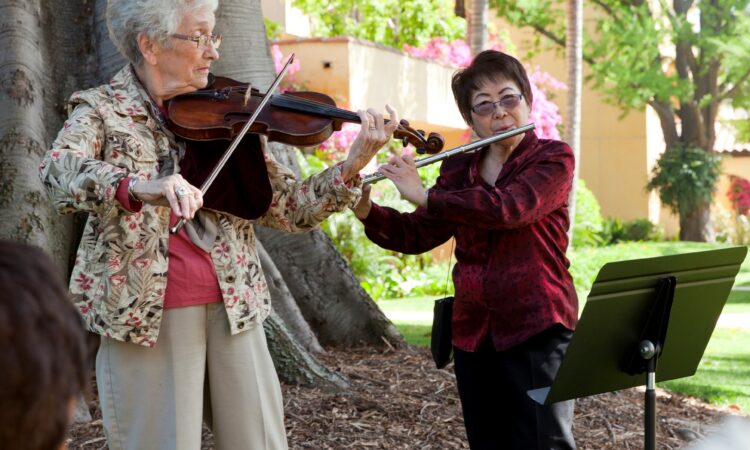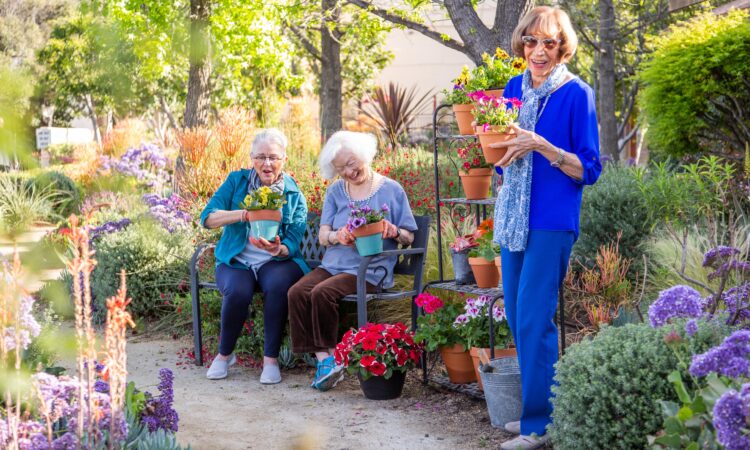Hollenbeck Palms
Literacy and active mental activities may reduce dementia risk

As people age, loneliness can also increase due to various life circumstances and changes. Fewer social activities or the loss of loved ones can all contribute to feelings of isolation and loneliness.
Chronic loneliness is also known to contribute to a higher risk of developing dementia symptoms due to its negative effects on cognitive function, brain health and human spirit.
New hints on these dynamics are in play in a new study by Monash University. The study is focused on investigating the association between leisure activities, social networks and dementia risk among older individuals. The key finding is that engaging in adult literacy activities and active mental activities were associated with a significant reduction in dementia risk when compared to socialization.
Moreover, study participants involved in creative and artistic pursuits, as well as passive mental exercises, experienced a diminished risk of dementia, though to a slightly lesser degree.
Lifestyle enrichment activities
For more than a decade, the study involved 10,318 individuals 70 years and older. The individuals involved were part of the Australian-based ASPREE Longitudinal Study of Older Persons. When they joined the study, they were generally healthy and did not have significant memory or thinking problems.
Some of the activities that were assessed include:
- Engaging in adult literacy like writing letters, journaling, using a computer and participating in education classes.
- Playing games, cards or chess and solving crosswords or puzzles.
- Exploring crafts, woodwork, metalwork, painting or drawing.
- Passive cognitive pursuits like reading books, newspapers, magazines, viewing television and enjoying music or radio broadcasts.
- Meeting and interacting with friends and taking part in social outings.
These activities were categorized into five groups: adult literacy, active mental, creative artistic, passive mental and social activities. Participants who frequently engage in these tasks had up to an 11 percent lower risk of developing dementia, according to the study. The results were more favorable for activities that challenged the mind compared to those involving social skills.
The lead author of the study underscored the importance of identifying strategies to stave off or slow down the progression of dementia. While the research did not promise these activities as a direct pathway toward prevention of dementia, the results indicated that they are more likely to promote sustained cognitive health in older individuals over the long haul.
The study’s approach allowed researchers to examine leisure activities that could potentially lower the risk of dementia in older people. They carefully considered other factors that could influence the results, making their conclusions about the effects of various activities on dementia risk more trustworthy.
Los Angeles Dementia Care Facility
The Hensel Memory Enhancement Center at Hollenbeck Palms is a caring place for people with advanced dementia and related illness.
With a focus on compassion and engagement, the center is a supportive haven for individuals and their families facing the challenges of dementia symptoms and Alzheimer’s.
In some cases, and as symptoms progress, individuals who may need more specialized care outside their homes may seek a center like this that is specially designed for their unique needs with private and shared suites, a dining area, activities and a secure garden, among other amenities.
These residents are an integral part of our Hollenbeck Palms community. Our approach to care involves understanding each person as a whole, appreciating their distinct qualities and abilities in the present moment. This understanding allows us to create personalized activity and care plans tailored to the unique needs of each individual.
The center also partners with a renowned dementia care expert, Laura Wayman, to train staff in compassionate and effective communication with residents, which better equips us to offer a safe, secure, engaging, loving and valued environment for residents experiencing dementia symptoms.
For those interested in discovering more about the Hensel Memory Enhancement Center, you can schedule a visit by reaching out to us at [email protected] or by giving us a call at (323) 307-4505.


